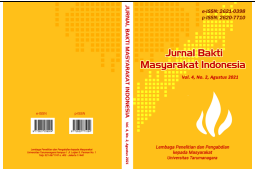PENINGKATAN PENGETAHUAN ORANGTUA MENGENAI DAMPAK PENGGUNAAN GADGET PADA ANAK USIA DINI DI TKK TUNAS HARAPAN BOGOR
Main Article Content
Abstract
Article Details
This work is licensed under a Jurnal Bakti Masyarakat Indonesia https://creativecommons.org/licenses/by-nc-sa/4.0/
References
American Optometric Association. (2019). New WHO guidance: Very limited daily screen time
recommended for children under 5. https://www.aoa.org/news/clinical-eye-care/publichealth/screen-time-for-children-under-5?sso=y
Aprilia, I. (2018). Dampak buruk terlalu lama lihat gadget pada mata anak. https://www.orami.co.id/magazine/dampak-buruk-terlalu-lama-lihat-gadget-pada-mataanak/
Datareportal. (2018). Digital 2018: Indonesia. https://datareportal.com/reports/digital-2018-indonesia (Accessed 31st June 2019)
Indonesia Digital Landscape. (2018). Device usage 2018.
https://www.slideshare.net/rumahide/indonesia-digital-landscape
Kozeis, N. (2009). Impact of computer use on children’s vision. Hippokratia 13(4), 230-231. PMCID: PMC2776336.
Pusat Data dan Teknologi Informasi Kementerian Pendidikan & Kebudayaan (n.d.). Data referensi kementerian pendidikan & kebudayaan. Retrieved from https://referensi.data.kemdikbud.go.id/tabs.php?npsn=20269760 (Accessed 31st June 2019)
Rosiyanti, H. & Muthmainnah, RN. (2018). Penggunaan gadget sebagai sumber belajar mempengaruhi hasil belajar pada mata kuliah matematika dasar. Fibonacci: Jurnal Pendidikan Matematika dan Matematika, 4(1), 25-36.
Ruder, D., B. (2019). Screen time and the brain: Digital devices can interfere with everything from sleep to creativity. https://hms.harvard.edu/news/screen-time-brain
Sekolah Kristen Tunas Harapan. (2014). Sekolah Kristen Tunas Harapan. http://tunasharapan.sch.id/
Statista Research Departement. (2015). Forecasted number of mobile phone users in Indonesia from 2013 to 2019. https://www.statista.com/statistics/274659/forecast-of-mobile-phoneusers-in-indonesia/
Straker LM, Coleman J, Skoss R, Maslen BA, Burgess-Limerick R, Pollock CM. (2008). A comparison of posture and muscle activity during tablet computer, desktop computer and paper use by young children. Ergonomics, 51(4), 540-555. doi: 10.1080/00140130701711000. PMID: 18357540.Tim Dapodik. (n.d.). Sekolah kita. https://sekolah.data.kemdikbud.go.id/
index.php/chome/profil/412CF0CF-3A1F-421F-96F2-12AA00F10C18
Winther, DK. (2017). How does the time children spend using digital technology impact their mental well-being, social relationship and physocal activity? An evidence-focused literature
review. Innocenti Discussion Paper 2017-02. UNICEF Office of Research - Innocenti Florence. https://www.unicef-irc.org/publications/925-how-does-the-time-children-spendusing-digital-technology-impact-their-mental-well.html



